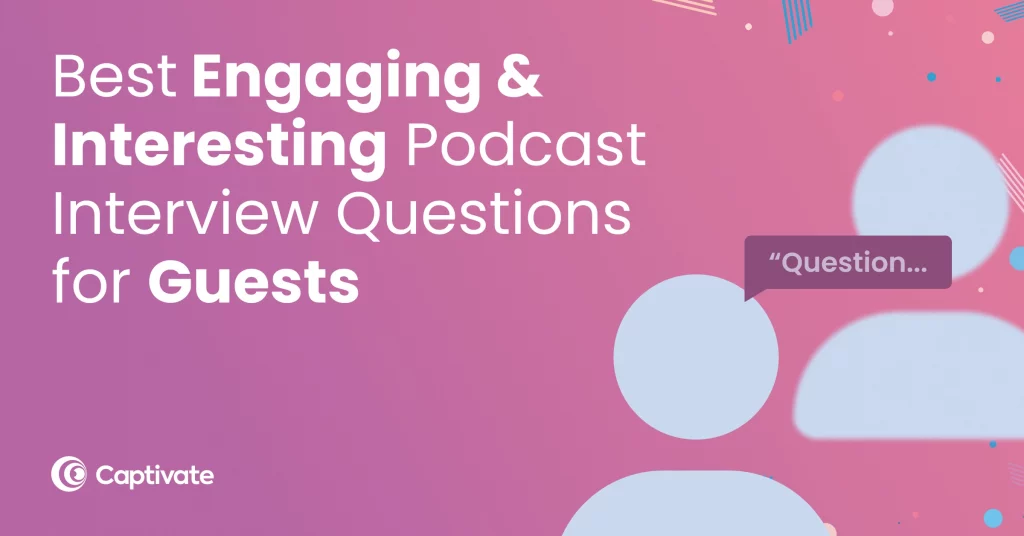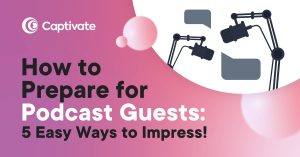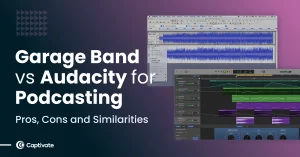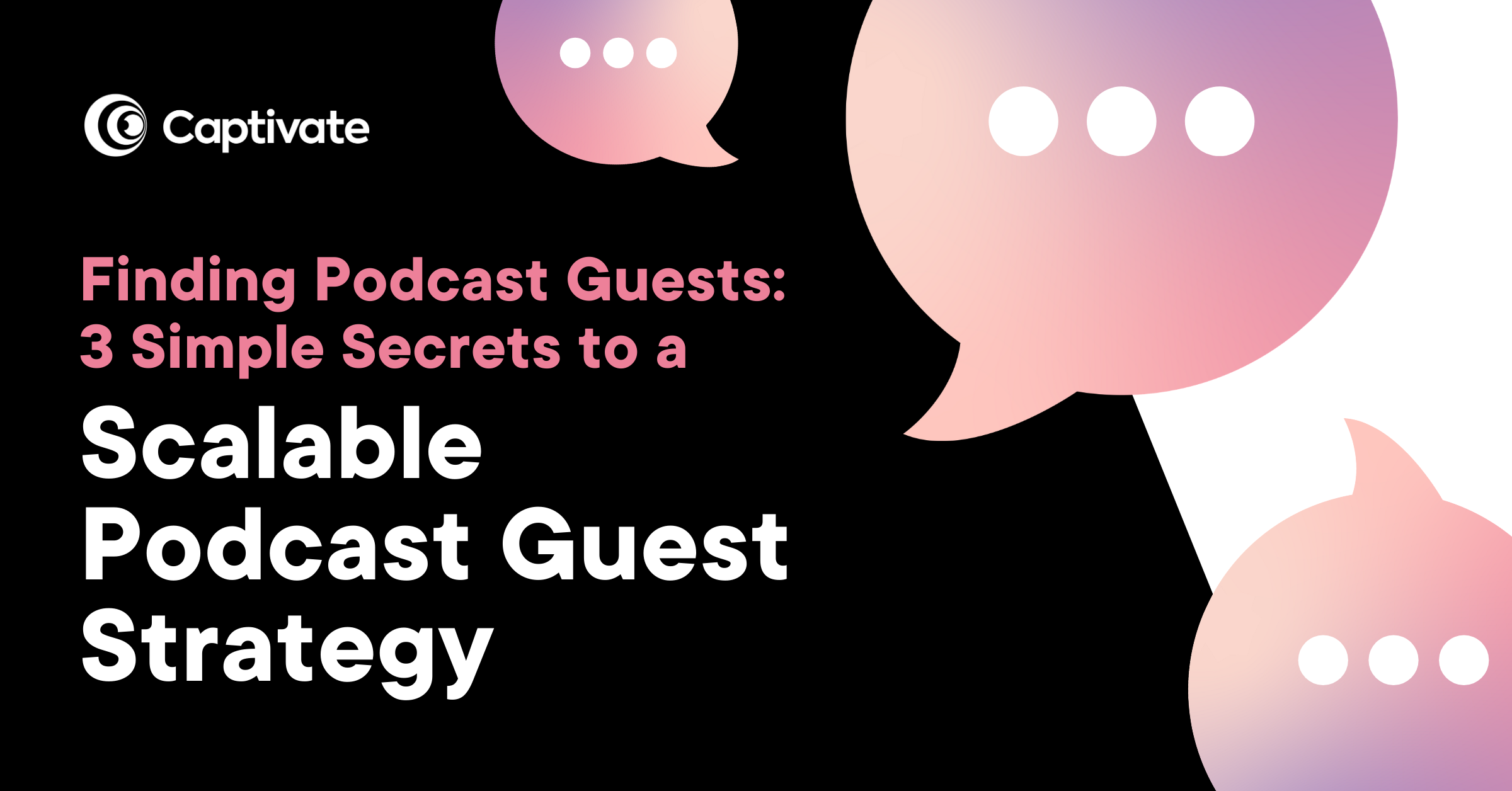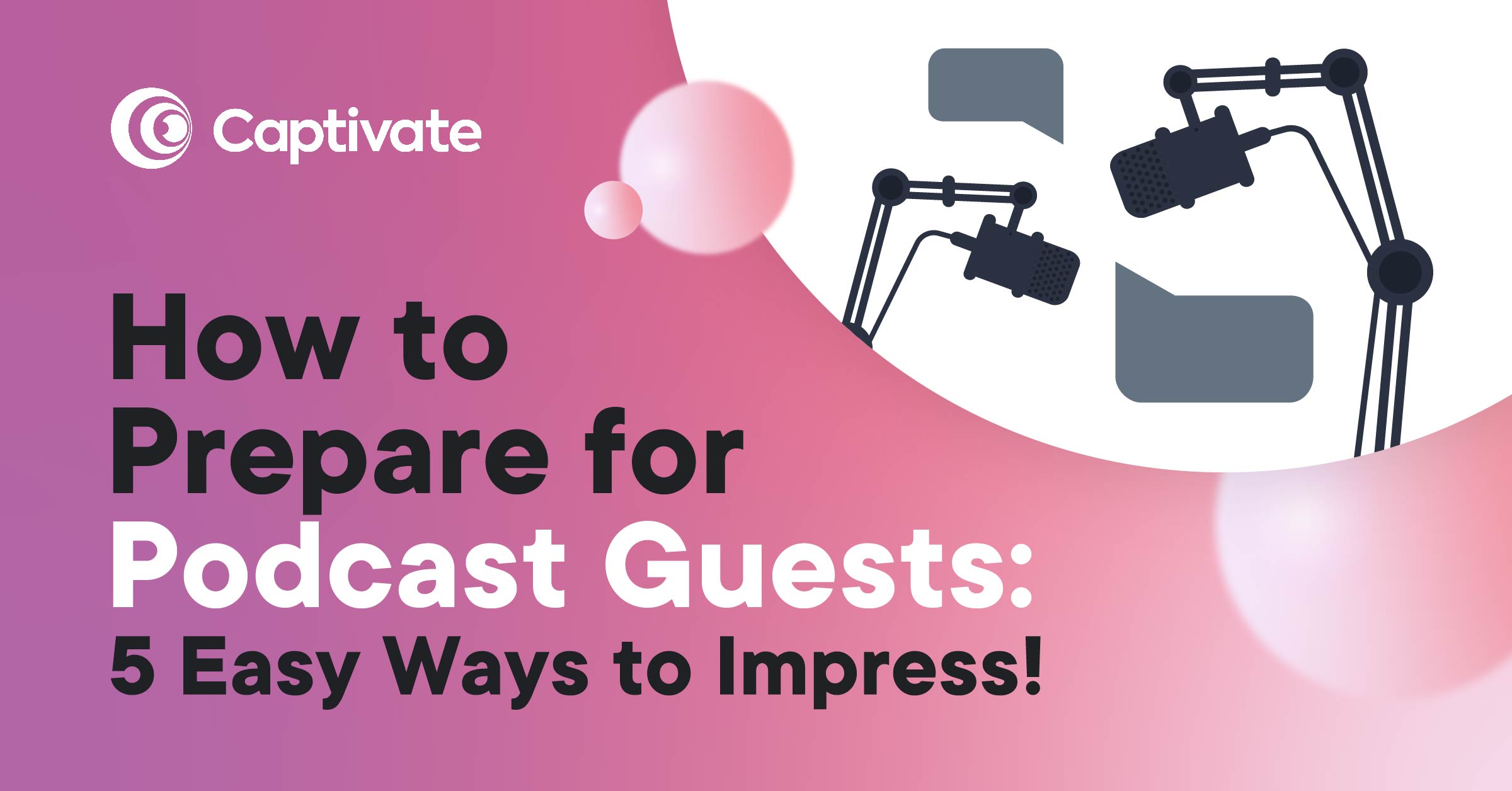How do you craft podcast questions to ensure an interesting and engaging interview, every time? In this article, we’ll talk about how to strike the right tone with your podcast interview questions, discuss the do’s and don’ts when crafting your own questions and give you 80 great examples of interview questions you can use yourself.
In this article...
What makes a good podcast interview question?
The perfect interview question will be different for every guest you’re talking to and every topic you explore – what’s appropriate and engaging in one interview would just be totally wrong in another. The key to being a good interviewer is having a good understanding of the topic, your guest and their background, and from those what kind of tone and content is appropriate for you to take. Let’s take a look at some broadly applicable examples of understanding tone in practice.
Directness / Aggressiveness is likely appropriate if your show centres on lively, passionate debates. A great example of this is if you’re interviewing politicians or public servants, because they’re answering for how they’ve spent public money and making decisions which impact the country. The interviewee is appearing under the context of communicating a political message, and therefore some level of combative analysis is required and expected to cut through to the real story. A famous pioneer of this style is Jeremy Paxman.
Tactfulness and care are required when interviewing someone discussing a personal story, whether that’s some kind of trauma, or with someone who is accustomed to being in the public eye. As a podcaster, you can make a decision as to whether to provide questions in advance, and whether to “retake” questions with a person who isn’t happy with their initial answer. Doing either of those would be an example of tact and care, but wouldn’t be appropriate with a politician, for example.
In-depth, expert questions are effective when prying deep into someone’s background, experience or creative process, and are appropriate for when you’re interviewing creators like artists, writers and musicians or industry experts and entrepreneurs. Creators are likely coming on the show under the context of promoting a latest piece of work and discussing its influences and creation, and therefore research into them and their history and deep, thought provoking questions are appropriate. With industry experts and entrepreneurs, you’ve likely invited them on the podcast to get their expert knowledge on a particular topic and a taste of their entrepreneurial journey. Make sure to put the work in here: read articles they’ve written, interviews they’ve already done and watch any potential TED talks to ensure you can ask original, thought provoking questions and make the process engaging, both for them and for your audience.
Let’s take a look at some examples of different question types.
Icebreaker questions
Icebreaker questions relieve the awkwardness inherent in interview situations and bring the two participants closer together, creating a friendly, casual tone for the rest of the interview. Here are ten examples you could use:
- What’s the most interesting place you’ve ever visited?
- If you could have dinner with any historical figure, who would it be and why?
- What’s your favorite book and why does it resonate with you?
- What’s your go-to karaoke song?
- If you could time travel, where would you go?
- What’s the most unusual job you’ve ever done?
- What’s the best piece of advice you’ve ever received?
- If you could have dinner with any fictional character, who would it be?
- What’s the weirdest talent you have?
- If you had a time machine, would you fix your past mistakes or see your future?
Personal questions
Personal questions are appropriate when a guest is here to shed light on themselves or their work, and serve to reveal interesting and hitherto unknown aspects of themselves to your listeners. It’s a good idea to listen to, watch or read previous interviews they’ve done, so you can ask new and unique questions and reveal new information. Here are ten examples you could use:
- What sparked your interest in your field?
- Can you share a pivotal moment in your life that shaped who you are today?
- What inspires you to carry on?
- What’s the best piece of advice you’ve ever received, and how has it influenced you?
- How do you handle challenges or setbacks?
- Can you talk about a book, movie, or piece of art that has had a profound impact on you?
- How do you balance your professional life with personal interests and relationships?
- What’s something you wish you had known ten years ago?
- What’s your biggest regret?
- Can you talk about a mentor or someone who has played a significant role in your life?
Industry and expertise questions
Expert questions are appropriate when your interviewee has a deep knowledge about something which your listeners are interested in. They allow you and your interviewee to really dig deep into that topic – to have a real and meaningful discussion, it pays to have done your research on it. Here are ten examples you could use:
- What do you see as the most significant trends or developments in your field right now?
- Where do you see your field in ten years?
- Can you share a specific project or accomplishment that you’re particularly proud of?
- Can you highlight a specific innovation or breakthrough that you find particularly exciting?
- What advice would you give to someone looking to enter [specific industry] today?
- Can you discuss a common misconception you’d like to clear up?
- How do you communicate complex ideas or concepts in a way that is accessible to a broader audience?
- How did you do this [specific example from their career]?
- What’s your biggest gripe with the industry as a whole?
- Who’s the biggest influence on you and your work?
Quick-fire and rapid questions
Quick-fire questions are a great way to get a guest’s gut response on universally applicable topics, loosen up the vibe and gain an insight into their personality without them having ages to prepare a response. Here are ten examples you could use:
- Coffee or tea?
- Early bird or night owl?
- Dogs or cats?
- One thing you can’t live without?
- What’s your go-to comfort food?
- Summer or winter?
- Sweet or savory?
- What’s one song you have to sing along to?
- City life or countryside?
- What’s your favorite way to relax after a long day?
Funny and lighthearted questions
Funny, lighthearted questions are a great way to dispel any potential tension and put guests and listeners at ease. Again, these are best if the guest answers on instinct rather than taking lots of time to think about them. Here are ten examples you could use:
- What’s your weirdest childhood nickname and the story behind it?
- If your life had a theme song, what would it be?
- What’s the strangest food combination you enjoy that others might find odd?
- What’s the funniest joke you know?
- What’s the most absurd piece of advice you’ve ever received, and did you follow it?
- If you were a flavor of ice cream, what would you be called, and what would be your main ingredient?
- What’s the most bizarre dream you’ve ever had?
- What fictional world would you want to live in for a month, and how would you spend your time there?
- What’s the funniest thing a family member has ever said to you?
- If you could create a holiday, what would it be called, and how would people celebrate it?
Deep and thought provoking questions
These questions are for when you want to get existential with your guests, to find out what makes them tick and talk about the values underneath their actions. Here are ten examples you could use:
- Do you believe in true love?
- What’s the meaning of your life?
- What do you think happens when you die?
- What do you think is the biggest problem the world is currently facing?
- Would you live your life differently if you could do it again?
- What’s your biggest flaw?
- What do you do to make a positive impact on those around you?
- Are you happy with the way you spend your time?
- What do you think is the primary function of art?
- Could you be friends with someone who doesn’t share your ideas and values?
Questions to engage the listener
These types of questions allow for listener participation, making them feel more connected with the podcast and hosts, helping to build a sense of community. They also give listeners the opportunity to apply the tips and insights shared in episodes. Here are ten examples for inspiration:
- What is the key takeaway for our listeners who have tuned in this week?
- What is the best way for our listeners to reach out to you with questions?
- How can our audience stay up to date with what has been discussed today?
- What one action would you like listeners to take after listening today?
- What books or other resources would you recommend to our audience?
- How can our listeners apply what has been discussed today?
- How can our audience get the most out of today’s episode?
- What advice would you give to our listeners, that you wish someone had given you?
- Is there a project, event, or initiative you’d like to share or promote with our audience?
- What advice would you give to our listeners who are struggling with [problems or challenges related to the episode]?
Closing questions
Closing questions bring the interview to a natural conclusion, drawing out summarizing remarks from the interviewee and allowing you both to shape the impression you want to leave your listeners with. Let’s take a look at ten examples:
- Who would you recommend following on social media to learn more about what has been discussed?
- What other podcasts would you recommend listening to on this subject?
- What do you expect will start trending next year?
- What advice would you give to someone aspiring to follow a similar path in their career or interests?
- Is there a question you wish I had asked you during this interview, and if so, what would your answer be?
- As we wrap up, is there a piece of wisdom or a motto that you live by?
- What has been the most rewarding aspect of your journey so far, personally or professionally?
- What’s a memorable piece of feedback or advice you’ve received from your audience or peers?
- Is there someone you’d like to shout out or express appreciation for?
- What’s one word or phrase that encapsulates the essence of your approach to life or work?
What you should do when crafting your interview questions
Research
Consume everything about your guest you possibly can: previous interviews, public appearances and any work they’ve put out, especially the work they’re on a press tour to promote, if that’s applicable. Use this knowledge to craft detailed, personal questions which allow them to really open up – they’ll also be naturally flattered by your interest and preparation, and likely repay that with candidness.
When you’re reading, watching or listening to interviews, make a note of questions that have already been asked, and avoid them. It’s fine to repeat top level questions that will give your listeners an idea of who the guest is and what they’ve done, but if there’s anything particularly specific and juicy, try and find a new angle to avoid rehashing content that’s already out there.
If the interview is more about a topic than a person – for example, medical science, and you’re interviewing a doctor to get an idea of that field rather than them as a person, you’d do well to research that topic so that you can understand their answers and build a rapport. Google Trends is a good resource to find trending topics within a given field and ride the popular wave.
Ask open ended questions
As a general rule, don’t ask questions that could be answered with a “yes” or a “no” – they’re not conducive to an open conversation, and can stunt the flow of your interview. You’re better to ask questions that invite a guest to explain why they feel a certain way, and to explain their views in detail.
Don’t ask: “Do you think the sky is blue?”
Ask: “Why do you think the sky is blue?”
Go with the flow
When a guest responds, listen carefully to their answer and try to build on it with further questions. This allows you to collectively dig deeper into the subject at hand, and ensures the conversation is engaging for both participants. Listen to interviews – you can tell when the interviewer is just waiting for the guest to stop talking so they can ask the next question they’ve written down, and when they’re actually listening and responding dynamically. Just because something is on your plan doesn’t mean you have to ask it – there of plenty of reasons not to, a big one being that you already covered it with a previous question.
Establish a connection
If it’s appropriate, try to build a rapport with your guest by being attentive to their answers, showing that you care and that you’ve done your research and doing your best to make them comfortable. It’s worth spending a bit of time before the interview just chatting and getting to know one another, making the whole process more informal. Not only will this make your guest’s life better, it’s good from a selfish perspective, too – a comfortable guest will give a more candid interview, and will let their friends and colleagues know that you’re a trustworthy, knowledgeable and reliable interviewer.
What you shouldn’t do when crafting your interview questions
Don’t forget the audience
As an interviewer, you’re acting as surrogate for your listeners – asking questions on their behalf to illuminate details of the guest’s story for them. When planning and asking your questions, always consider your audience avatar – your ideal listener, and the person you’re aiming all of your content at – and what kinds of things they’ll want to understand and have explained for them.
Don’t misread the vibe
When you’re planning your interview, think what your guest is appearing for – what’s their goal in being interviewed? Remember how we discussed voice and tone, and what’s appropriate. As a podcaster, it’s fair to say you probably won’t be getting aggressive and combative with politicians, so don’t get too probing with your questions. If you are looking to get personal, it’s usually best to work up to it – establish a rapport with your guest and make them comfortable, and they’ll be more likely to be open with the bigger questions.
Don’t try and cram too many questions in
We’ve all been there. You’ve scored an exciting guest for an episode, and you have a whole list of questions that you’re eager to ask them. But remember, less is more. Go through your list and prioritize the most important questions and be willing to spend time digging into them with your guest. Don’t put too much pressure on yourself to get through them all – let yourself be inspired by the answers you get, and follow them down tangents and through the natural flow of the conversation.
Another article we think you'd like...
Reading Time: 6 minutes Guest interviews are one of the best ways to grow your podcast and reach new audiences. Here are 5 tips on how to bag the best podcast guests and impress them at interview!
Don’t forget to ask for feedback
Especially if you’re just starting out, it can be really valuable to find out what your guests thought worked, and what you could improve on. After recording, it’s worth asking informally how your guest felt about the interview, and if there’s anything they’d like you to bear in mind for the future.
FAQs
- Do I need to stick to my questions?
It’s good to have questions there as a guide, but feel free to read the vibe of the interview and go where it leads you. Essentially, the questions are there to fall back on, but if you end up on an interesting tangent that eats up all your time, that’s totally fine – a natural conversation will resonate well with your listeners.
- Should I send guest interview questions beforehand?
It depends. If you want your guest to arrive comfortable, having had time to prepare answers they’re happy with and with a more rehearsed narrative, then you should send them. If you’re trying to get gut reactions or be a little more prying and combative, you’d be unlikely to afford your guest the chance to prepare answers.
- How do I deal with nervous podcast guests?
Take reasonable steps to make them comfortable, like spending time chatting before you hit record, letting them know what to expect with the interview, and asking if there’s anything they want to focus on or avoid. You could also make it clear you’re willing to redo certain questions if they give an answer they’re not comfortable with. A few lighthearted questions at the start of the interview can work wonders to relieve any tension, too.
- How do I handle guests who are giving short answers?
Ask open ended questions, and if they’re giving short answers, keep asking why they feel the way they do. Rephrase questions that they’re avoiding and come at the same topic from different angles to get a rounded perspective.
- How do you handle disagreements or controversial topics during an interview?
Again, this depends on the vibe of your show. If you’re there for a lively debate, lean into conflicts and see if you can convince one another of your respective viewpoints. If you can see your guest is becoming uncomfortable, make it clear to them that you’re happy to edit certain parts out and have an off-mic chat to resolve issues, if these are indeed actions you’re willing to take.
- How do I use a signature question as a show notable?
A show notable is like a catchphrase, and it’s a great way to build up your personal brand and give listeners some consistency between episodes. Developing a signature interview question is a great way to incorporate a notable into your format!
Takeaway
Crafting effective interview questions is a real art that involves understanding your guest, the context of the interview and what your audience wants. The key is to tailor your questions to suit the appropriate tone for each guest, their reasons for being interviewed and the story both of you want to tell.
Research your guests, including past interviews to avoid questions they’ve already been asked, and be reactive to their answers to dig deep into the issues they’re passionate about – all these factors lead to a natural and engaging conversation which will really appeal to your target audience.
As you prepare your questions, consider the vibe of the interview and the goals of your guest. Whether you’re aiming for a lighthearted and funny atmosphere or a deep and reflective discussion, your questions should align with the overall tone of your podcast.

